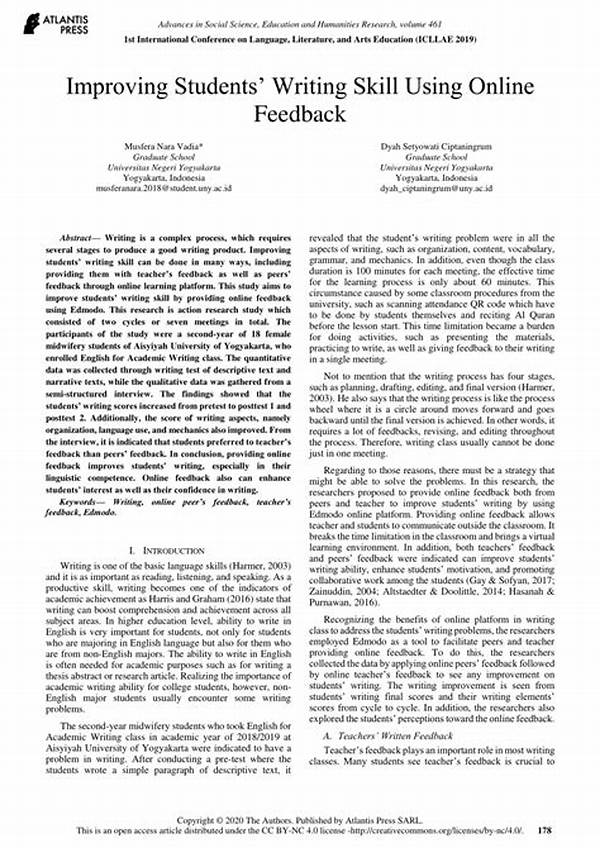Writing is a vital skill that transcends various aspects of life, from academic pursuits to professional development. Regardless of your current writing level, improving writing through feedback is a powerful way to enhance this essential skill. Feedback serves as a mirror, reflecting strengths and areas for improvement, enabling writers to evolve. This article explores various facets of how feedback can shape and refine writing abilities, offering insights and practical tips along the way.
The Impact of Constructive Criticism
Constructive criticism is an essential component of the feedback process. By focusing on improving writing through feedback, writers can gain a clear understanding of their strengths and weaknesses. Constructive feedback highlights areas needing improvement while providing suggestions on how to enhance writing skills. This type of feedback isn’t about pointing out faults but guiding writers toward betterment. For instance, feedback might suggest more vivid descriptions, stronger arguments, or clearer thesis statements, depending on the writing context. Importantly, feedback should always aim to motivate and encourage growth, fostering a supportive environment which writers require to thrive. In this way, feedback becomes more of a collaborative conversation than a one-sided critique, encouraging active engagement and learning.
Five Key Benefits of Effective Feedback
1. Clarity and Focus: Improving writing through feedback often involves enhancing clarity, ensuring the writer’s ideas are presented logically and coherently.
2. Enhanced Creativity: Constructive feedback can trigger new ideas and creative approaches, broadening the writer’s stylistic repertoire.
3. Skill Development: Feedback focuses on skill-building, encouraging writers to hone specific areas like grammar, tone, and style.
4. Confidence Boost: Receiving positive and constructive feedback can significantly boost a writer’s confidence, validating their effort and skill.
5. Reader-Centric Approach: Understanding reader interpretations through feedback helps writers tailor their message better, enhancing engagement.
The Role of Peer Review
Peer review is an invaluable tool for improving writing through feedback. Engaging with peers in a review process allows for diverse perspectives that can shed light on unnoticed aspects of one’s work. When peers critique each other’s writing, they provide fresh insights that can refine and enhance the text. Through discussions and exchanges, writers learn how to approach their work from different angles, which can lead to substantial improvements. This collaborative environment encourages open dialogue, fostering a community where writers of all levels can grow collectively. Furthermore, peer reviews mirror real-world scenarios where feedback from clients or colleagues is routine. Thus, it prepares writers for future professional settings where receiving and integrating feedback is crucial.
Strategies for Receiving Feedback Effectively
Receiving feedback effectively is an art in itself. Firstly, approach feedback with an open mind; remember that improving writing through feedback is a dynamic learning process. Secondly, differentiate between subjective suggestions and objective corrections, valuing both but recognizing their differences. Thirdly, don’t take feedback personally. It’s about the writing, not the writer. Fourth, implement changes gradually, focusing on the most critical aspects first. Lastly, ask questions if feedback is unclear—understanding the rationale behind suggestions can significantly aid in the improvement process.
Overcoming Challenges in Writing Feedback
Feedback can sometimes feel overwhelming, particularly when criticism outweighs compliments. However, recognizing that improving writing through feedback is a step-by-step journey can alleviate this burden. It’s essential to remember that everyone, even accomplished writers, benefits from feedback. Additionally, accepting that perfection is an unrealistic goal can help maintain perspective. Embrace the idea that writing is an evolving craft, where continuous improvement is far more valuable than instantaneous perfection. As writers refine their skills, they should celebrate small victories, acknowledging the effort invested in their development. By transforming feedback into a positive learning experience, writers can navigate challenges with resilience and optimism.
Building a Feedback-Friendly Environment
Creating a feedback-friendly environment is crucial for effective writing improvement. Encouraging openness and respect in feedback exchanges fosters a sense of community and support. When providing feedback, focus on being specific and encouraging. Readers and feedback givers should strive to highlight what works well before delving into areas of improvement. This positive reinforcement can motivate writers and spur further creativity. Conversely, maintaining a humble attitude when receiving feedback is equally important. Recognize the helpful nature of feedback and appreciate the time invested by others in offering their insights. By fostering this feedback culture, one can facilitate meaningful growth and learning.
Summary: The Feedback Journey
In conclusion, improving writing through feedback is an ongoing journey that offers countless benefits for writers at any stage. Crucially, feedback extends beyond merely pointing out flaws—it is a rich source of inspiration and motivation. By embracing feedback, writers can enhance clarity, creativity, and overall skill. Engaging with others through peer reviews or seeking feedback from mentor figures can unveil new perspectives and ideas. Even when challenges arise, a resilient attitude, coupled with openness to criticism, lays the foundation for continued development. Thus, cultivating a feedback-friendly environment is paramount. Through thoughtful exchanges and a commitment to growth, writers can transform feedback into a powerful tool for personal and professional advancement, ultimately enriching their writing craft for years to come.
